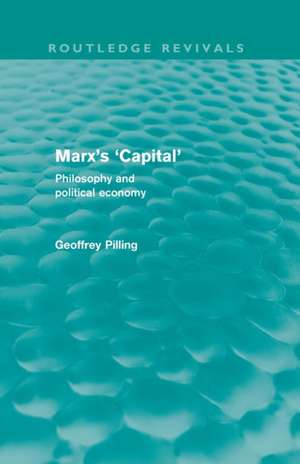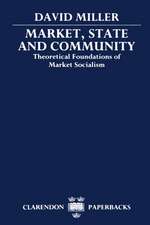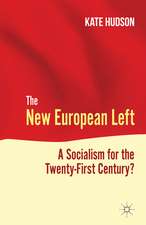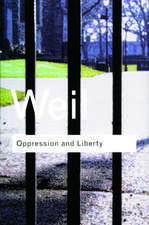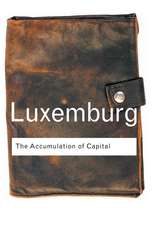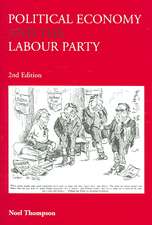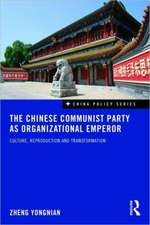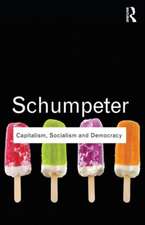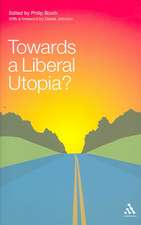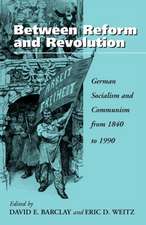Marx's 'Capital' (Routledge Revivals): Philosophy and Political Economy: Routledge Revivals
Autor Geoffrey Pillingen Limba Engleză Paperback – 10 apr 2015
Pilling emphasizes the fundamental nature of the break between Marx’s Capital and all forms of classical political economy, and stresses the revolutionary nature of Marx’s critique of political economy as one of the foundations of Capital. He also lays particular emphasis on the philosophical aspects of the work, so often neglected by British commentators, and puts forward the view that Marx’s notion of fetishism, often looked upon as incidental to his work, is in fact central to his entire critique of political economy.
| Toate formatele și edițiile | Preț | Express |
|---|---|---|
| Paperback (1) | 408.54 lei 43-57 zile | |
| Taylor & Francis – 10 apr 2015 | 408.54 lei 43-57 zile | |
| Hardback (1) | 816.08 lei 43-57 zile | |
| Taylor & Francis – 11 dec 2009 | 816.08 lei 43-57 zile |
Din seria Routledge Revivals
- 9%
 Preț: 801.71 lei
Preț: 801.71 lei - 8%
 Preț: 432.64 lei
Preț: 432.64 lei -
 Preț: 153.83 lei
Preț: 153.83 lei -
 Preț: 245.88 lei
Preț: 245.88 lei -
 Preț: 309.79 lei
Preț: 309.79 lei -
 Preț: 258.73 lei
Preț: 258.73 lei - 9%
 Preț: 764.35 lei
Preț: 764.35 lei - 9%
 Preț: 903.42 lei
Preț: 903.42 lei -
 Preț: 311.18 lei
Preț: 311.18 lei -
 Preț: 357.45 lei
Preț: 357.45 lei - 9%
 Preț: 626.93 lei
Preț: 626.93 lei -
 Preț: 317.54 lei
Preț: 317.54 lei - 9%
 Preț: 764.30 lei
Preț: 764.30 lei -
 Preț: 257.01 lei
Preț: 257.01 lei -
 Preț: 238.40 lei
Preț: 238.40 lei -
 Preț: 259.48 lei
Preț: 259.48 lei - 9%
 Preț: 938.10 lei
Preț: 938.10 lei -
 Preț: 341.33 lei
Preț: 341.33 lei -
 Preț: 264.10 lei
Preț: 264.10 lei -
 Preț: 294.98 lei
Preț: 294.98 lei -
 Preț: 308.89 lei
Preț: 308.89 lei -
 Preț: 207.40 lei
Preț: 207.40 lei -
 Preț: 347.50 lei
Preț: 347.50 lei -
 Preț: 302.59 lei
Preț: 302.59 lei -
 Preț: 389.40 lei
Preț: 389.40 lei -
 Preț: 257.01 lei
Preț: 257.01 lei -
 Preț: 358.30 lei
Preț: 358.30 lei - 9%
 Preț: 640.91 lei
Preț: 640.91 lei - 9%
 Preț: 619.49 lei
Preț: 619.49 lei -
 Preț: 228.88 lei
Preț: 228.88 lei -
 Preț: 265.16 lei
Preț: 265.16 lei -
 Preț: 257.90 lei
Preț: 257.90 lei -
 Preț: 266.06 lei
Preț: 266.06 lei -
 Preț: 258.73 lei
Preț: 258.73 lei -
 Preț: 384.01 lei
Preț: 384.01 lei -
 Preț: 246.38 lei
Preț: 246.38 lei - 9%
 Preț: 832.08 lei
Preț: 832.08 lei -
 Preț: 266.20 lei
Preț: 266.20 lei -
 Preț: 294.53 lei
Preț: 294.53 lei - 18%
 Preț: 695.86 lei
Preț: 695.86 lei - 9%
 Preț: 934.96 lei
Preț: 934.96 lei - 5%
 Preț: 243.38 lei
Preț: 243.38 lei -
 Preț: 274.69 lei
Preț: 274.69 lei -
 Preț: 208.20 lei
Preț: 208.20 lei - 9%
 Preț: 659.19 lei
Preț: 659.19 lei -
 Preț: 259.69 lei
Preț: 259.69 lei - 9%
 Preț: 1038.47 lei
Preț: 1038.47 lei -
 Preț: 389.46 lei
Preț: 389.46 lei -
 Preț: 302.14 lei
Preț: 302.14 lei -
 Preț: 302.27 lei
Preț: 302.27 lei
Preț: 408.54 lei
Nou
Puncte Express: 613
Preț estimativ în valută:
78.20€ • 84.97$ • 65.73£
78.20€ • 84.97$ • 65.73£
Carte tipărită la comandă
Livrare economică 21 aprilie-05 mai
Preluare comenzi: 021 569.72.76
Specificații
ISBN-13: 9781138874107
ISBN-10: 1138874108
Pagini: 228
Dimensiuni: 138 x 216 x 12 mm
Greutate: 0.27 kg
Ediția:1
Editura: Taylor & Francis
Colecția Routledge
Seria Routledge Revivals
Locul publicării:Oxford, United Kingdom
ISBN-10: 1138874108
Pagini: 228
Dimensiuni: 138 x 216 x 12 mm
Greutate: 0.27 kg
Ediția:1
Editura: Taylor & Francis
Colecția Routledge
Seria Routledge Revivals
Locul publicării:Oxford, United Kingdom
Cuprins
1. Introduction 2. Marx’s Critique of Classical Economics 3. The Concepts of Capital 4. The Significance of the Opening Chapters 5. Some Aspects of Marx’s Notion of Commodity Fetishism
Descriere
Marx’s Capital has of course been widely read; this revival of a systematic study by Geoffrey Pilling, originally published in 1980, argues powerfully that, in order to understand Capital fully, it is necessary to have read and understood Hegel’s Logic. This argument leads to a detailed examination of the opening chapters of Capital, and a re-examination of their significance for the work as a whole.
Pilling emphasizes the fundamental nature of the break between Marx’s Capital and all forms of classical political economy, and stresses the revolutionary nature of Marx’s critique of political economy as one of the foundations of Capital. He also lays particular emphasis on the philosophical aspects of the work, so often neglected by British commentators, and puts forward the view that Marx’s notion of fetishism, often looked upon as incidental to his work, is in fact central to his entire critique of political economy.
Pilling emphasizes the fundamental nature of the break between Marx’s Capital and all forms of classical political economy, and stresses the revolutionary nature of Marx’s critique of political economy as one of the foundations of Capital. He also lays particular emphasis on the philosophical aspects of the work, so often neglected by British commentators, and puts forward the view that Marx’s notion of fetishism, often looked upon as incidental to his work, is in fact central to his entire critique of political economy.
